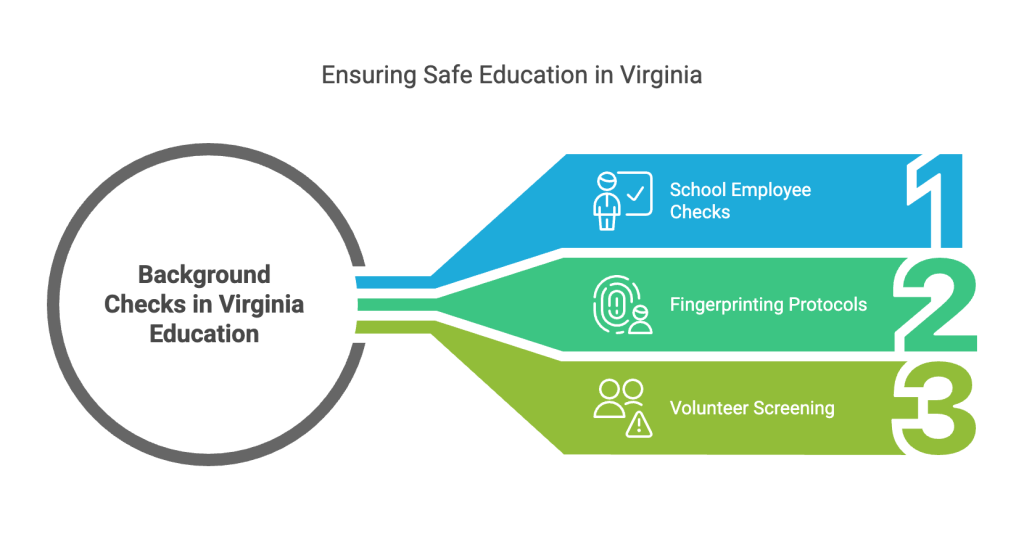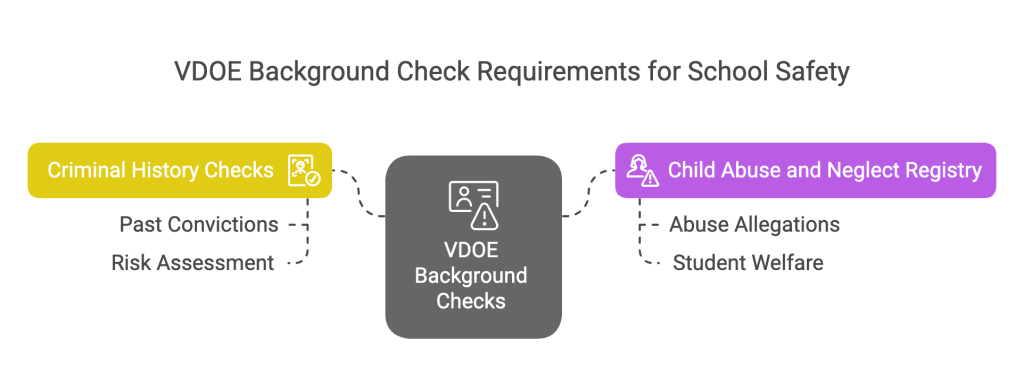Background checks are a vital part of ensuring the safety and integrity of educational environments. In Virginia, the process is guided by specific requirements laid out by the Virginia Department of Education (VDOE). Whether you're a prospective employee, a school volunteer, or involved in managing an educational institution, understanding these requirements is crucial.
This comprehensive guide will delve into the intricacies of Virginia school background checks, spotlighting the role of VDOE fingerprinting and the protocols for school volunteer screening in VA. We aim to equip you with the essential knowledge to navigate these processes efficiently.
Key Takeaways
- Background checks in Virginia schools are crucial for creating safe environments for students and staff.
- The Virginia Department of Education sets the guidelines for background checks to ensure consistency and thoroughness in all schools.
- All school employees, volunteers, and contractors in Virginia are required to undergo criminal history checks and fingerprinting.
- Volunteer roles in schools require background checks to ensure safety, with schools often coordinating these checks with local authorities.
- Preparing for a background check involves gathering necessary documentation, understanding your rights, and ensuring the accuracy of your records.
Introduction
Background checks in education have gained traction as more than a formality. In Virginia, they serve as a fundamental tool to ensure safe learning environments. With growing concerns about safety, the stateâs focus on comprehensive background checks emphasizes the importance of thorough vetting processes.
The Virginia Department of Education (VDOE) plays a pivotal role in this system. Its guidelines set the standard for how schools conduct background investigations. The VDOE dictates procedures that schools must follow to remain compliant and safeguard their communities.

Key areas of interest include school employee background checks, VDOE's fingerprinting protocols, and how volunteers are screened. These components form the bedrock of security measures in Virginia schools, highlighting the need for all stakeholders to understand and adhere to the established requirements. Your knowledge of these processes not only aids compliance but also fortifies trust within educational settings.
Understanding Virginia School Background Checks
Much like a sturdy foundation is crucial for a building, background checks are fundamental to ensuring the safety of students and staff in Virginia schools. They serve as a safeguard against potential threats, reinforcing the trust placed in educational environments. Such checks are not just about ticking boxes. It's about creating a safe and secure atmosphere where learning can thrive.
Virginia's approach to school background checks is anchored in both state and federal laws. The primary legal frameworks come from legislation like the Fair Credit Reporting Act and checks mandated by state legislatures. These laws balance the need for comprehensive screening with the protection of individual rights. If you want to dive deeper into these legal requirements, the Department of Labor's website is a great resource.
The Virginia Department of Education (VDOE) plays a central role in this ecosystem. It sets the standards and guidelines that local school boards must follow. By doing so, the VDOE ensures consistency and thoroughness in the background screening processes. But it doesnât work alone. Local school boards implement these guidelines, tailoring them to suit the specific needs and contexts of their schools. Meanwhile, law enforcement agencies provide the critical link for accessing and verifying criminal history data.
Together, these players form a robust network that upholds the integrity of Virginiaâs educational settings. As someone engaging with these processesâbe it as an applicant or an administratorâit's essential to understand who's involved and what each entity contributes. This clarity empowers you to navigate the system with confidence and ensure that the children's well-being is always the priority.
VDOE Requirements for Background Checks
Every educator, staff member, and contractor stepping into Virginia schools must pass a background check. The Virginia Department of Education (VDOE) mandates this to ensure safety. The checks cover several facets, each playing a role in keeping schools safe.

Firstly, VDOE requires criminal history checks. These focus on past convictions, with particular attention to offenses that may indicate a risk to students. A clean criminal record reassures schools of one's suitability for a nurturing educational environment.
In addition, the Child Abuse and Neglect Registry is a critical part of the screening. Checking this registry helps identify individuals with a history of abuse or neglect allegations. This step is about safeguarding vulnerable students. Schools want to ensure everyone they hire prioritizes student welfare.
The process aims to identify any red flags in a candidate's background that could compromise the safety standards of the school's community. If youâre handling this process, understanding these checks is vital. Organizations must integrate requirements into hiring protocols to maintain thorough screening. Itâs not just about compliance; itâs about building trust with parents and safeguarding students. Do your hiring practices reflect these essential checks?
VDOE Fingerprinting: What You Need to Know
Fingerprinting plays a crucial role in the background check process for anyone working in Virginia's educational system. It ensures thorough vetting and helps maintain a safe school environment.
Process Overview
The VDOE fingerprinting process is straightforward. First, you schedule an appointment with an authorized fingerprinting location. Many places offer online booking for convenience. On the day, bring the necessary identification documents. After fingerprinting, the data gets sent electronically for processing and evaluation.
Who Needs Fingerprinting?
Fingerprinting isn't just for teachers. It's required for all personnel with direct student contactâthis includes administrative staff and certain contractors. If you're involved in the school environment beyond a casual engagement, expect this requirement to apply to you.
Technical Details
The fingerprinting process uses live scan technology. It's a digital method, which ensures higher accuracy and faster transmission of data compared to traditional ink methods. This technology reduces the likelihood of errors and speeds up the entire verification process.
Processing Time and Costs
Once completed, fingerprint results generally return within 1-2 weeks. However, delays can occur during high-volume periods, so plan accordingly. Fees vary by location and agency, but typically hover around $50-$70. Some school districts cover these costs for new hires, but this isn't universal, so check beforehand.
Understanding and complying with these fingerprinting requirements is essential to becoming part of the educational workforce in Virginia. With the correct preparation, this step becomes a manageable part of the hiring process.
School Volunteer Screening in Virginia
Volunteers play a crucial role in Virginiaâs schools, but it's imperative to ensure that all volunteers undergo background checks. These screenings are necessary to maintain a safe environment for students and staff. Screening volunteers isn't just a precautionâit's a responsibility shared by educational institutions.
The process begins with identifying which roles require checks. Generally, any volunteer who might interact with students or access sensitive areas in a school must be screened. The procedure involves a criminal background check that focuses on the individual's history that might affect their suitability to work around children.
Volunteers must submit their personal information and consent to these checks. Schools typically coordinate with local authorities to obtain and verify the required data. This process not only helps in vetting the volunteers but also aligns with school safety policies, reinforcing the communityâs trust in the system.
Renewals of these checks are important as well. Many schools require screenings to be updated annually or bi-annually to reflect any new developments in a volunteer's background. This practice keeps the screening process robust and reliable, ensuring that volunteers continuously meet the safety criteria.
Ultimately, integrating volunteer screening within school safety policies strengthens the institution's security measures. It's a proactive step in creating a secure and trustworthy educational atmosphere, where the focus remains on learning and development without compromising on safety.
How to Prepare for a Virginia School Background Check
Getting ready for a Virginia school background check involves some straightforward steps that ensure you're prepared and informed. Here's a simple guide to help you navigate this process.
Document Gathering
Start by collecting personal information and documentation. You'll generally need a government-issued ID, proof of residency, and any relevant professional licenses. Having these documents ready minimizes delays.
Understanding Rights and Responsibilities
It's crucial to know your rights during a background check. You're entitled to see the results and discuss any findings. Schools have the responsibility to handle your information confidentially and use it solely for hiring purposes.
Handling Rejections
Not every background check ends on a positive note. If your check returns disqualifying information, ask for a copy. Understand why it may affect your prospects and check its accuracy. Should there be errors, you have the right to correct them. Approach the hiring body, be open to explaining your circumstances, and provide any additional documentation that might help clarify your situation.
Preparing yourself for a background check not only smooths the hiring process but also empowers you to actively engage with your rights and responsibilities.
Conclusion
Regulations in the background check industry arenât static. They evolve and adapt, influenced by emerging issues like identity theft or new legal mandates. The challenge here is staying updated. Laws can differ widelyâeven within statesâso itâs essential for schools and applicants alike to be informed about current legal requirements. Schools should regularly review their background check policies to ensure compliance, and those subject to checks should seek out reliable information on their rights and the process.
In light of these challenges, staying proactive is key. Whether youâre an applicant or an administrator, understanding these aspects can lead to a more secure and efficient background check experience.
Frequently Asked Questions (FAQs)
What disqualifies you from working in VA schools?
You cannot work in Virginia schools if you have been convicted of certain crimes, such as violent felonies or sexual offenses. Additionally, a history of substance abuse or other misdemeanors may also disqualify you, depending on the school's policies.
How long do VA school checks take?
Background checks in Virginia schools typically take two to four weeks. However, timelines can vary based on the volume of applications and specific circumstances.
Are substitute teachers fingerprinted in Virginia?
Yes, all substitute teachers in Virginia must undergo fingerprinting as part of the background check process.
Can a DUI affect school employment in VA?
Yes, a DUI can impact your ability to work in Virginia schools, especially if it suggests a pattern of behavior. Each case is assessed individually.
How to appeal a denied school clearance in VA?
To appeal a denied clearance, you should contact the school districtâs human resources office. They will guide you through the appeal process, which typically involves providing additional information or context.
Do private schools follow VDOE rules?
Private schools in Virginia are not required to follow Virginia Department of Education (VDOE) rules. However, many adopt similar standards for safety and operational consistency.
Are expunged records visible to VA schools?
No, expunged records are not accessible to Virginia schools during background checks.
Whatâs the cost of school fingerprinting in VA?
The cost for fingerprinting in Virginia schools varies, but it generally ranges from $35 to $50.
Do volunteers need checks in VA schools?
Yes, volunteers working in Virginia schools typically need to undergo background checks to ensure student safety.
How often must school employees renew checks?
School employees in Virginia generally need to renew their background checks every five years or when there is a change in employment status.
What is required for teacher certification in Virginia?
To become a certified teacher in Virginia, you need a bachelor's degree, completed educator preparation program, and passing scores on the required certification exams.
Can a non-U.S. citizen work in Virginia schools?
Yes, but they must have a valid work visa and meet all educational and certification requirements for their position.
How can I find job openings in Virginia schools?
You can find job openings by visiting school district websites or using educational job portals such as the Virginia Department of Education's official site.
What professional development opportunities are available for VA school staff?
Virginia offers various workshops, seminars, and courses, often through regional educational centers or partnerships with universities, to help educators and school staff stay updated.
Definitions
Background Checks â A process used by employers to verify a candidateâs history before hiring. In Virginia schools, this includes reviewing criminal records and child abuse registries to ensure a safe learning environment.
Compliance â Meeting legal and regulatory requirements set by governing bodies. Schools must follow the Virginia Department of Educationâs (VDOE) background check guidelines to maintain a secure workplace.
Fingerprinting â A method of identity verification using digital scans of fingerprints. Virginia schools use fingerprinting to check criminal histories and confirm that employees and volunteers meet safety standards.
Screening â The process of evaluating an individualâs background to determine their suitability for a role. Schools screen employees and volunteers by checking legal records and other sources to protect students.
Legal Framework â The set of laws and regulations that govern background checks. In Virginia, this includes both federal laws, like the Fair Credit Reporting Act, and state-specific rules to ensure fairness and accuracy.

GCheck Editorial Team
Meet the GCheck Editorial Team, your trusted source for insightful and up-to-date information in the world of employment background checks. Committed to delivering the latest trends, best practices, and industry insights, our team is dedicated to keeping you informed.
With a passion for ensuring accuracy, compliance, and efficiency in background screening, we are your go-to experts in the field. Stay tuned for our comprehensive articles, guides, and analysis, designed to empower businesses and individuals with the knowledge they need to make informed decisions.
At GCheck, we're here to guide you through the complexities of background checks, every step of the way.





